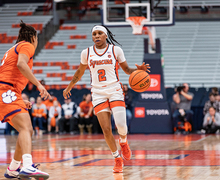Face-guarding could affect Syracuse-Northwestern matchup in NCAA quarterfinals
TJ Shaw | Staff Photographer
Nell Copeland face-guards Emily Hawryschuk in February.
Northwestern’s Nell Copeland inched closer and closer to Emily Hawryschuk at the 45-yard line. Within a foot, the Wildcat defender bent down — her grey Under Armor goggles level to the star attack’s chest — and looked up. The ball was on the other side of the field, out of their sight, but Copeland wouldn’t stop bothering Hawryschuk.
She stuck her tongue out and tried to make Hawryschuk laugh, but never broke eye contact. The SU junior, in the midst of a hat trick in the first 22 minutes, said she wasn’t fazed.
“I didn’t let her get in my head,” Hawryschuk said after Feb. 24’s game.
But Hawryschuk couldn’t score for the next 40 minutes. For final two-thirds of their first matchup of the season, Hawryschuk was neutralized until she broke through and scored the game-winning goal.
With two of the top attacks in the nation in Hawryschuk and Selena Lasota — both 70-plus goal scorers — facing off on Saturday, No. 5-seed Syracuse (16-4, 5-2 Atlantic Coast) and No. 4-seed Northwestern (15-4, 5-1 Big Ten) will look for a personalized defense on the other’s superstar. In most cases, the teams will try to face-guard them: when a player is assigned specifically to an attack to limit their space and opportunities with the ball. Copeland slowed down Hawryschuk earlier this season, and the Orange most recently used the strategy to limit Georgetown’s Taylor Gebhardt to just one shot after a seven goal performance two days prior.
“There’s different strategies. One is to play six-on-six and the other is to try some niche plays to get them out,” SU head coach Gary Gait said. “…Sometimes, it works. You take the player out and the rest of team scores, score a lot of goals, and win the game.”

TJ Shaw | Staff Photographer
The Wildcats have found success previously with face-guarding. While Hawryschuk eventually broke away from Copeland to score the winner, Notre Dame attack Maddie Howe struggled to stay efficient when facing the Wildcats.
In two matchups against Copeland — including a second round NCAA tournament matchup — Howe scored four goals on 15 shots. In the second game, Notre Dame ran plays for Howe to get open resulting in 11 shots. But she only converted at a 27% clip, her fourth worst of the season.
Copeland didn’t have to press Hawryschuk all the way at midfield when they were both far from the play, but she did. Hawryschuk said Copeland was trying to get in her head, but that’s not what affected her.
What did affect Hawryschuk was NU’s switch from one-on-one to zone in the second half, which put more pressure on Hawryschuk if she broke away from Copeland. Before, Hawryschuk was able to use picks to get free. In the second half of their first matchup, she could only play off-ball.
Unlike Northwestern — who has switched in-between zone and one-on-one — the Orange rely solely on zone, something the Wildcat offense hasn’t seen a lot of this year. What hindered Gebhardt in Sunday’s game was SU’s zone paired with a backer. Georgetown head coach Ricky Fried prepared for either to happen, not both.
“In the zone, you get the ball to the player all day long,” Gait said, “but there’s a backer ready to help at all times. It doesn’t help your team to give to the player who’s shut out.”
Gebhardt stood away from most offensive players because Fried elected to play six-on-six — eliminating both the attack and defender from the possession. On that particular day, SU’s defensive strategy worked.
After SU’s 14-8 win, questions of Georgetown and Syracuse’s strategies kept coming up in the postgame press conference. Fried scratched his head, yet stuck by his decision to have a defender face guard.
Gait couldn’t help but smile. As soon as the first question came up, the 11-year head coach pointed to Hawryschuk, who had seven points.
“You should talk to Emily,” he said, “she’s been there multiple times this year.”
On Saturday, she might be there again.
“You got to prepare for it,” Gait said. “If you’re not prepared for it, it’s tough to jump into the game and bring that player back.”
Published on May 17, 2019 at 11:20 pm
Contact KJ: [email protected] | @KJEdelman




